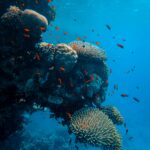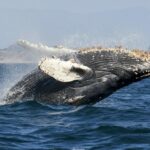
Plant a Coral. Did you know that you can adopt a coral and support its research?
Created by the University of the Algarve’s Marine Sciences Center, the Plant a Coral project aims to rescue specimens accidentally caught in fishing nets and
We didn't find any happenings mapped to your criteria.
Try the traditional search to find articles not yet mapped with RUA.
We didn't find any happenings mapped to your criteria.
Try the traditional search to find articles not yet mapped with RUA.
We didn't find any happenings mapped to your criteria.
Try the traditional search to find articles not yet mapped with RUA.
We didn't find any happenings mapped to your criteria.
Try the traditional search to find articles not yet mapped with RUA.
The reefs have been affected by global warming, but have recovered due to the marine protected areas.
A scientific expedition team has discovered that in more remote areas of the Pacific Ocean, coral reefs are resistant to climate change. “When you have an intact ecosystem, nature has the capacity to recover on its own,” said Alan Friedlander, the expedition’s chief scientist, at a press conference.
The expedition is part of National Geographic’s Pristine Seas program, which has provided more than 40 expeditions in 30 locations since 2008. In the Pacific, scientists have been conducting extended dives to cover all the sites, where they distribute cameras and collect data for analysis.
In the most remote areas, the abundance of fish (due to marine protected areas) helps explain the corals’ resilience. Enric Sala, founder of the program and explorer for the National Geographic Society, mentioned that in the Marshall Islands there are fish capable of producing around 5,000 kilos of sand every year through, for example, excrement. This sand “protects the coastline from storms, waves and rising sea levels”.
One of the major concerns in these places is illegal fishing. Thousands of boats make up a deep-sea fishing fleet, but they face little regulation. These vessels are responsible for producing a significant amount of debris, including fishing nets and various types of plastic that end up on the reefs.
At the end of the research, one of the objectives is to pass on the results of the expedition to the locals, so that they can continue to protect the ecosystems.


Created by the University of the Algarve’s Marine Sciences Center, the Plant a Coral project aims to rescue specimens accidentally caught in fishing nets and

The sanctuary will conserve the resident population of more than 200 sperm whales living near the Caribbean island of Dominica and sequester carbon off the

This article addresses an action that promotes the adoption of urgent measures to fight climate change and its impacts. SDG 13 also aims to improve education on climate change mitigation and impact reduction.
 To discover businesses that are actively working to contribute to this Sustainable Development Goal, click here.
To discover businesses that are actively working to contribute to this Sustainable Development Goal, click here. To read news, interviews or tips related to this Goal, click here.
To read news, interviews or tips related to this Goal, click here.Esta publicação também está disponível em:
![]() Português (Portuguese (Portugal))
Português (Portuguese (Portugal))

